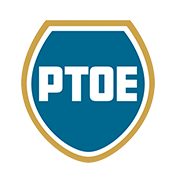
Exam Format and Content

The subjects on each PTOE certification examination are selected to conform to the blueprint of subject domains and sub-domains listed below. The number of questions in each sub-domain area reflects the relative importance of that content area as determined by a comprehensive validation process involving judgments of several hundred practicing traffic operations engineers.
The exam is administered in two 3 hour sessions with a break in between.
| Subject Domain / Sub-Domain | Number of questions |
| Traffic Operations Analysis | 27 |
| Roadway and intersection operations | 7 |
| Freeway operations | 5 |
| Traffic flow concepts | 4 |
| Road user characteristics and accommodations | 5 |
| Travel demand management | 2 |
| Intelligent transportation systems | 4 |
| Operational Effects of Geometric Designs | 31 |
| Design context and functional classification | 4 |
| Road user characteristics and accommodations | 4 |
| Geometric design controls and criteria | 6 |
| Roadways and roadsides | 6 |
| Intersections | 6 |
| Freeways, ramps, and interchanges | 5 |
| Traffic Safety | 31 |
| Road safety concepts | 10 |
| Safety analysis and evaluation | 6 |
| Safety countermeasures | 9 |
| Safe System Approach | 6 |
| Traffic Control Devices | 26 |
| Signing application | 4 |
| Traffic signal application | 4 |
| Marking application | 3 |
| Roadway/railroad grade crossings | 3 |
| Work zones and temporary applications | 4 |
| Road user guidance | 3 |
| Transportation Systems Management and Operations applications | 2 |
| School zone applications | 3 |
| Traffic Engineering Studies | 20 |
| Applied statistical analysis | 3 |
| Operational characteristics | 5 |
| Traffic engineering study types and applications | 5 |
| Assessment of traffic trends and performance | 3 |
| Site impact analysis | 4 |
| Social, Environmental, and Institutional Issues | 15 |
| Environmental considerations | 2 |
| Transportation and land use planning | 3 |
| Multimodal considerations | 3 |
| Transportation legal considerations | 4 |
| Equity and access | 3 |
Questions within each category are designed to determine the candidate’s competence at different cognitive levels:
- Knowledge
- Analysis
- Comprehension
- Synthesis
- Application
- Evaluation
At the knowledge level, candidates are expected to know terminology, measurement systems and basic engineering and physical relationships relevant to transportation. Candidates are expected to know basic relationships common to professional traffic operations practice; however, they will be provided with a variety of formulas and values related to the solution of examination problems, which a practicing traffic operations engineer would not normally be expected to commit to memory.
At application and analysis levels, the candidate is required to determine the factors essential to the solution of a problem and select an appropriate solution—frequently using mathematical processes. It should be noted, however, that the examination is not intended to test the applicant’s mathematical skills. Examination questions may be presented in either metric or English units and answers may be required in either form. Tables of conversion factors will be provided.
To assure objective scoring, the correct response to questions requiring synthesis and evaluation are based on documented sources drawn from references widely used in the profession.